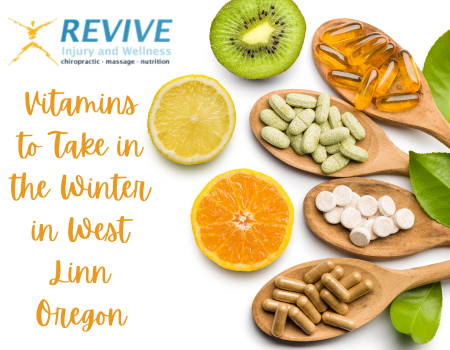As winter casts its chilly spell over West Linn, Oregon, staying well-nourished is essential for maintaining robust health in the face of seasonal challenges. The colder months often bring a shift in dietary habits and sunlight exposure, potentially impacting vitamin levels. Let’s explore the key vitamins that can help West Linn residents thrive during winter, addressing common concerns associated with the season.
Vitamins to Take in the Winter in West Linn Oregon

1. Vitamin D: The Sunshine Vitamin
Why it’s important in winter:
West Linn’s winter can be cloudy and damp, reducing exposure to natural sunlight. Vitamin D is crucial for bone health, immune function, and mood regulation.
Sources:
– While sunlight is the best source, West Linn residents may benefit from vitamin D-rich foods like fatty fish, fortified dairy or plant-based milk, and supplements if recommended by a healthcare professional.
2. Vitamin C: Immune Boosting Ally
Why it’s important in winter:
Winter often brings an uptick in colds and flu. Vitamin C is renowned for its immune-boosting properties, helping the body defend against infections.
Sources:
– Incorporate citrus fruits, strawberries, bell peppers, and leafy greens into your diet for a vitamin C boost. Supplements can also be considered under professional guidance.
3. Vitamin A: Eye Health and Immunity
Why it’s important in winter:
Vitamin A supports immune function and helps maintain healthy vision, especially important during the darker winter months.
Sources:
– Include sweet potatoes, carrots, kale, and spinach in your meals. These foods are rich in beta-carotene, which the body converts to vitamin A
4. Vitamin E: Antioxidant Defense
Why it’s important in winter:
Vitamin E’s antioxidant properties shield cells from harm, especially during winter when the immune system may be taxed.
Sources:
– Almonds, sunflower seeds, spinach, and avocados are excellent sources of vitamin E. Including these in your winter diet can contribute to overall health.
5. Vitamin K: Bone Health Support
Why it’s important in winter:
Vitamin K is an indispensable nutrient for maintaining both bone integrity and blood clotting processes. Maintaining optimal levels is crucial, especially during a season where outdoor activities may be limited.
Sources:
– Dark leafy greens such as kale and spinach, broccoli, and Brussels sprouts are rich in vitamin K. Including a variety of these vegetables in winter meals is beneficial.
6. Vitamin B12: Energy and Mood Booster
Why it’s important in winter:
Vitamin B12 supports energy production and mood regulation. With shorter days and less sunlight, maintaining adequate B12 levels becomes vital for overall well-being.
Sources:
– Incorporate B12-rich foods such as fish, meat, dairy, and fortified plant-based milk. Supplements can be considered, especially for those following a vegetarian or vegan diet.
Tips for Winter Vitamin Intake in West Linn, Oregon:
1. Seasonal Eating:
Embrace seasonal produce available in West Linn during winter, such as root vegetables, winter greens, and citrus fruits. These not only provide essential vitamins but also connect you to local and fresh options.
2. Consider Supplements:
If dietary intake alone is insufficient, consider vitamin supplements. However, it’s crucial to consult with a healthcare professional to determine the appropriate dosage and avoid unnecessary excess.
3. Stay Hydrated:
Winter’s cooler temperatures might reduce the sensation of thirst, but staying well-hydrated is essential for nutrient absorption and overall health. Ensure that everyday you drink adequate amounts of water.
4. Balanced Diet:
Seek out a nutritionally balanced diet that features a variety of food groups. This ensures you obtain a spectrum of essential vitamins and minerals necessary for overall health.
In the winter months of West Linn, Oregon, proactively managing your vitamin intake is a key component of maintaining optimal health. Whether through seasonal eating, vitamin-rich foods, or well-considered supplements, addressing the unique challenges of winter can contribute to a robust immune system, elevated mood, and sustained energy levels. As always, it’s advisable to consult with a healthcare professional for personalized guidance based on individual health needs. By prioritizing your winter nutrition, you can fortify your body against the seasonal nuances and embrace the colder months with vitality and resilience.
More on Our Services
Ergonomics, Posture and Chiropractic Health
5 Questions to Ask Your Chiropractor About Neck Pain
How to Choose the Right Chiropractor
5 Things to Consider When Dealing with Neck Injuries
Is a Chiropractor Visit Scary?
How Soon After a Car Accident Should You Visit a Chiropractor?


